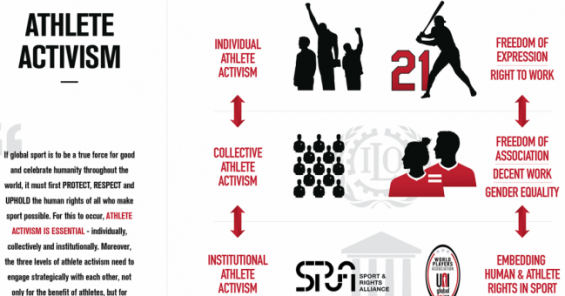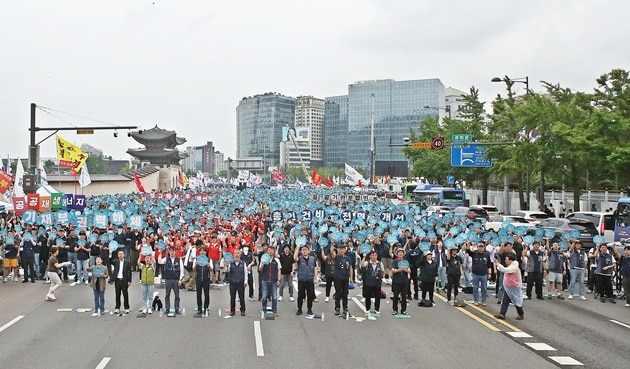If sports organizations had listened to athletes 50 years ago, sport could have helped shape a just and inclusive world.
This is an opinion piece by Brendan Schwab, Executive Director of the World Players Association. It first appeared in LawInSport on 25 June 2020.
Statements from the leaders of some of the world’s most influential sports bodies, such as FIFA and the NFL, that athlete activists should not be punished are welcome – but meaningless – without systemic change.
It is now time for sport’s leaders to demonstrate the same courage as athletes and deliver long overdue reformation of sports governance and law.
Athletes across many sports have taken a leading role in #BlackLivesMatter protests both on and off the field following the killing of George Floyd in the United States.
FIFA President Gianni Infantino said the players’ actions “deserve an applause not a punishment”. But words and applause are not and will never be enough.
Freedom of expression is a great enabling right upon which so many other human rights and freedoms depend. It cannot exist at the whim of Presidents.
It takes great courage for athletes to sacrifice what is inherently a short term and precarious career for a point of principle. That courage is amplified by archaic sports regulations that punish athletes who speak up for human rights and the very values that sport purports to promote.
Had the International Olympic Committee (IOC) not condemned – but listened to – Tommie Smith, Peter Norman and John Carlos when they stood up for human rights and against racial oppression from the Olympic podium in 1968, sport could have played a transformative role in uniting the world over the last 50 years.
Just like the many brave athletes who have honoured the legacy of 1968 through their example, major sports bodies must stand up for human rights and against racial injustice at all times, especially when it is uncomfortable for them to do so.
After all, what systemic change has there been? The IOC earlier this month reiterated that 1968’s podium protest would still contravene IOC rules today and will do so again in 2021 in Tokyo. The very same rules deny athletes that other great enabling right – to freedom of association. Only last year FIFA increased the gender pay gap despite women soccer players taking action throughout the world for equality. Colin Kaepernick[ may have sacrificed his career. Bilqis Abdul-Qaadir and Hakeem Al-Araibicertainly lost theirs.
The Commonwealth Games Federation (CGF) has been uniquely proactive in committing that athlete activism will not be punished at the 2022 Commonwealth Games. The CGF is “comfortable with the unconfortable conversation”, and can back that commitment with a comprehenisive human rights policythat was adopted in 2017.
Only the CGF and FIFA have human rights policies, despite respect for internationally recognised human rights now being “a global standard of expected business conduct” and, accordingly, sports governance. However, FIFA’s policy performance – according to its own human rights advisory board – wants for lack of accountability and buy-in at the highest levels of FIFA governance, even though its human rights commitments are stated to be “binding on all FIFA bodies and officials”. The IOC has, through its Athletes’ Rights and Responsibilities Declaration, undermined the very rights of athletes it purports to protect by seeking to redefine them through sporting norms.
Meanwhile, World Athletics insists that, as a private body, it “is not subject to human rights instruments such as the Universal Declaration of Human Rights or the European Convention on Human Rights”. This approach threatens not only sport’s social licence but exposes many people to egregious human rights violations. As a global business enterprise, World Athletics has a clear responsibility to respect human rights which means: “to not violate them, to not facilitate or otherwise be involved in their violation. And it entails a correlative responsibility to address harms that do arise”.
All major sports bodies must embed respect for human rights into everything they do and ensure that those whose rights are violated in the name, business or politics of sport can access justice, including an effective remedy. Systemic racism in the world of sport must be understood, acknowledged and addressed.
This demands a comprehensive and ongoing process of human rights due diligence. Unless a sports body “can know and show that it respects human rights its claim that it does remains just that – a claim, not a fact”.
The building of mutual trust and understanding is also required, including through genuine dialogue with the World Players Association, its affiliated player associations and athletes. Standards need to be entrenched, especially the Universal Declaration of Player Rights.
Systemic change must embrace everyone who makes sport possible, including workers, fans, the media, women, children, racially and religiously marginalised groups, indigenous peoples, members of the LGBTI community and the local communities in which mega-sporting events are held.
Only when this has occurred, can sport help shape a just and inclusive world.


